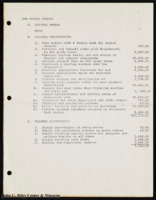-

Various property records from the Tomlisnon Abstract Co. in Port St. Joe, Florida. It includes an abstract of Title that covers October 1945-March 1951 and covers all conveyances, leases, mortgages, liens, notice of lis pendens, judgements, and decrees associated with that land from that period.
-

The Obituary for Damon P. Peters, Sr., one of the share owners of the former Money Bayou Beach Corporation.
-

A "Living History" pamphlet about American Beach (Fla.) and MaVynee Betsch's efforts to preserve its history. It includes a reprint of an article by Kimberly N. Martin about Betsch and her efforts to make a museum for the beach with the artifacts she had collected over the years. It also contains a list of twelve historic streets in the community.
-

A copy of a New York Times article on American Beach (Fla.) which appeared in print on April 6, 1998, Section A, Page 14 of the National edition with the headline: Fernandina Beach Journal; A Black Beach Town Fights to Preserve Its History. The first page contains a picture of MaVynee Betsch, the great-grandaughter of American Beach founder, Abraham Lincoln Lewis. The rest of the article goes into detail about the environmental and economic threats to the Beach community, as well as Betsch's efforts to preserve it.
-

A nomination for MaVynee Betsch for the First Coast African American Woman Award, written by Ivy Bigbee. In the text, she details Betsch's contributions to environmental and historical preservation (particularly the preservation of American Beach), as well as her other civic contributions. Bigbee also mentions her close collaboration with Betsch, explaining their work photo documenting and recording the history of American Beach since 1992.
-

An essay MaVynee Betsch wrote for an unidentified journal. Betsch focused most of her life on the preservation of American Beach, and was a strong proponent of the dunes' spiritual energy. In the piece, she details her connection to the beach. There is a note from her written on the page that reads, "I wrote this for a Native-American Spiritual Journal."
-

A page from Wayne W. Wood's "Jacksonville's Architectural Heritage: Landmarks for the Future," highlighting the A. L. Lewis Mausoleum. The handwritten notes above the entry state "this is from a page in the Book on Architecture in Jacksonville--the only African-American item!" Abraham Lincoln Lewis was Florida's first African-American millionaire and president of the Afro-American Life Insurance Company. He most notably founded American Beach during segregation as a community that welcomed African-Americans at a time when most beaches would not. The entry highlights his other achievements, as well as his burial place.
-

An advertisement for the documentary film titled "an AMERICAN BEACH," documenting the story of American Beach on Amelia Island, which provided African Americans with beach access during segregation. It connects the beach's beginnings, originally founded by Abraham Lincoln Lewis in the Jim Crow era, to the modern-day efforts of his great-granddaughter, MaVynee Betsch, also known as the "Beach Lady." In addition to outlining historic context, the film highlights MaVynee's efforts to protect her community from encroachment by major developers in the area.
-

A postcard of American Beach: A Cultural Treasure advertising the Second Annual Florida State-Wide African American Heritage Preservation Conference that took place February 3-6, 1999. This event was sponsored by the Riley House Museum of African American History and Culture. The front of the postcard includes a picture of American Beach, which was founded in 1935 during segregation to provide African Americans with beach access, and the back contains details on the conference.
-

Report on major expenses undertaken by Raa Middle School towards infrastructure improvement. Lists varied expenses such as cost for painting buildings and new classroom purchases. No date, likely 1975.










